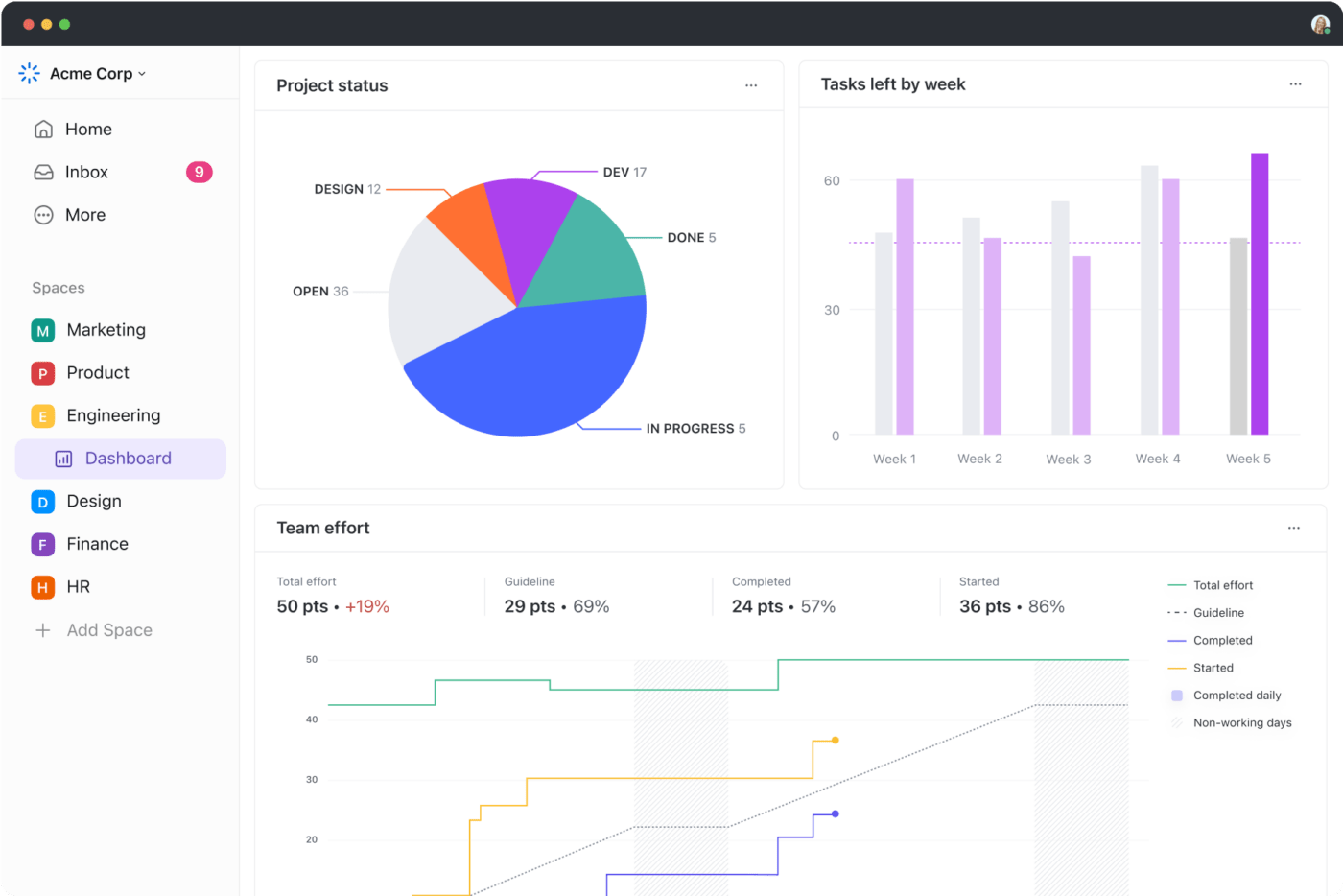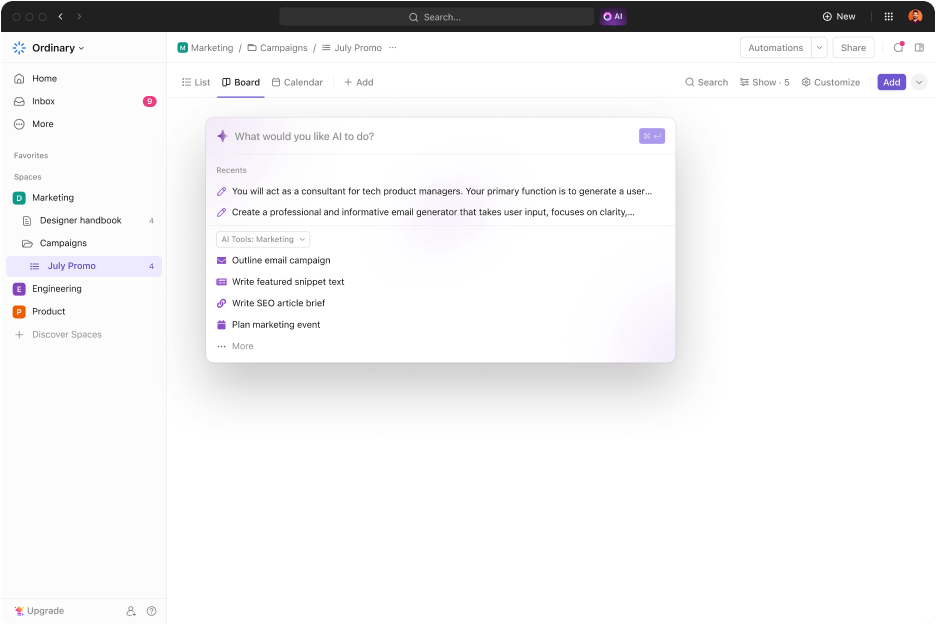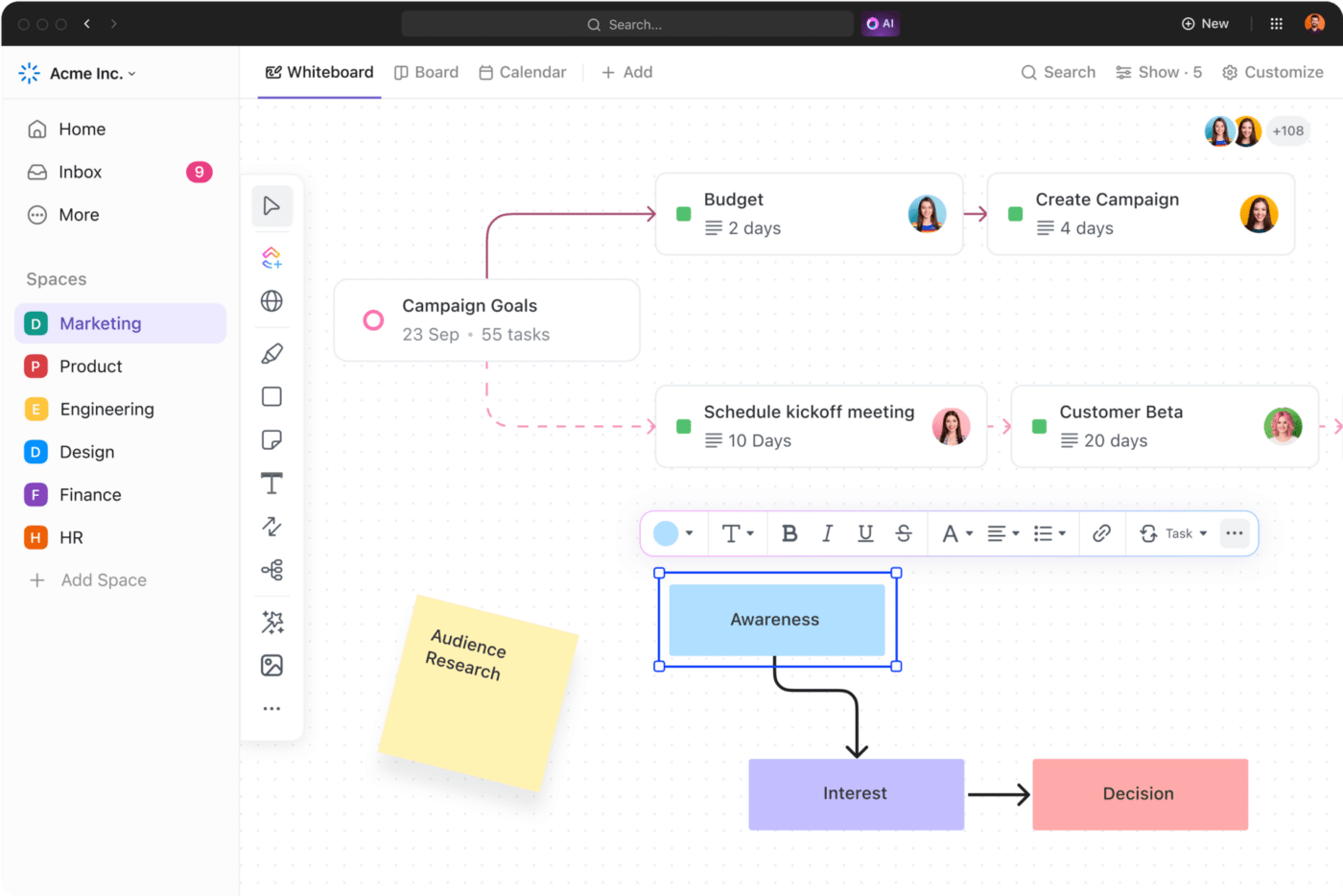Benieuwd naar wat jouw favoriete software zo krachtig maakt? De magie schuilt in open-source projecten, waar samenwerking innovatie stimuleert.
Of je nu een ontwikkelaar bent of gewoon interesse hebt in technologie, het kan overweldigend zijn om door het enorme open-source landschap te navigeren. Sommige projecten blijven misschien onopgemerkt en je wilt je vaardigheden niet investeren in projecten die misschien verdwijnen.
Mijn team en ik onderzochten open-source tools van machine learning tot webontwikkeling en ons onderzoek leverde waardevolle inzichten op. In deze blog ga ik een lijst geven van enkele coole open-source projecten, zodat je zeker weet dat je de beste tools tot je beschikking hebt.
De 24 beste open source projecten om aan bij te dragen
De juiste ontdekken tools voor open source projectmanagement bijdragen kan uw codeervaardigheden verbeteren en uw netwerk binnen de open-sourcegemeenschap uitbreiden
Hier zijn de 24 beste open source projecten die ideaal zijn voor nieuwe bijdragers, om u te helpen projecten naadloos te beheren
Communicatie- en samenwerkingstools
1. ClickUp (Beste voor alles-in-één aangepast projectmanagement)
Hoewel ClickUp voor softwareteams is geen open-source tool in de traditionele zin, maar weerspiegelt de basisprincipes van de open-source filosofie, zoals flexibiliteit, delen, samenwerking en gemeenschapsbetrokkenheid. De gebruikersvriendelijke interface, uitgebreide aanpassingsmogelijkheden en robuuste integratiemogelijkheden maken het een uitstekend hulpmiddel voor projectmanagement. ClickUp Projectmanagement biedt eersteklas privacy- en deel-functies, waardoor er geen compatibiliteitsproblemen optreden in het volledige bereik van functies voor projectmanagement. Net als bij open-source projecten waarbij ontwikkelaars hun tools kunnen aanpassen aan specifieke behoeften, biedt ClickUp uitgebreide aanpassingsmogelijkheden. Gebruikers kunnen weergaven en dashboards aanpassen aan hun voorkeuren en gedetailleerde automatisering instellen met verschillende apps.
ClickUp bevordert een samenwerkingsomgeving waarin gebruikers inzichten, tips en best practices kunnen delen via een gemeenschapsgroep . Dit gemeenschapsaspect weerspiegelt de open-source cultuur, waar gebruikers bijdragen aan de groei van de tool en de bruikbaarheid vergroten door kennis te delen.
ClickUp gebruikers profiteren van een rijke opslagplaats van bronnen, tutorials en door gebruikers gegenereerde content die hen helpt het potentieel van het platform te maximaliseren.
Bovendien kunnen ontwikkelaars hun werk verbeteren door te integreren met GitHub of applicaties te maken met behulp van de ClickUp API. Dit zorgt voor nog meer flexibiliteit en controle voor ontwikkelaars over projectmanagement workflows.
Lees meer: Hoe kunnen open API's uw werkstromen aanpassen?
Beste functies van ClickUp

houd alle projectgegevens binnen handbereik door uw ClickUp Dashboards aan te passen_
Houd alle projectgegevens binnen handbereik door uw ClickUp Dashboards aan te passen_ ClickUp Dashboards -dashboards op maat van uw project, voor uitgebreide zichtbaarheid en monitoring.

Creëer aangepaste automatisering om af te stemmen op uw workflows met ClickUp Automations
Stroomlijn open source projecten en workflows met ClickUp Automatiseringen door repetitieve taken zoals status updates en project handoffs te automatiseren. Deze mogelijkheid verhoogt de efficiëntie en vermindert handmatige fouten.

gebruik ClickUp Brain om uw projectplanning en -beheer te versnellen_
Versnel uw projecten door gebruik te maken van ClickUp Brein genereert subtaken op basis van beschrijvingen, vat threads samen en werkt taken autonoom bij, waardoor projectmanagement vlotter en intuïtiever verloopt.
/$$img/ https://clickup.com/blog/wp-content/uploads/2023/10/ClickUp-3.0-Docs-Subpages-Simplified-1400x934.png ClickUp 3.0 Documenten Subpagina's om documentatie over open source projecten te centraliseren /%img/
centraliseer projectdocumentatie met ClickUp Docs om uw team op één lijn te houden en op de hoogte te houden_
- Houd elk lid van het team op de hoogte en op één lijn door projectdetails uitgebreid te documenteren binnenClickUp Documenten
- Integreer naadloos met meer dan 200 tools zoals GitHub, Slack en Google Drive en verbeter de functies en verbindingen binnen uw technische stapel metClickUp integraties
Lees meer:
Top 10 API integratieplatforms om uw bedrijfsvoering te stroomlijnen in 2024

- Integreer naadloos met meer dan 200 tools zoals GitHub, Slack en Google Drive en verbeter de functies en verbindingen binnen uw technische stapel metClickUp integraties
Lees meer:
Top 10 API integratieplatforms om uw bedrijfsvoering te stroomlijnen in 2024
Collaborate in real time using ClickUp Whiteboards to turn brainstorming into structured project plans
Gebruik ClickUp Whiteboards om samenwerking in realtime bij strategische initiatieven te vergemakkelijken, door brainstormsessies om te zetten in uitvoerbare projecttaken.
ClickUp beperkingen
- Het freemium model kan sommige geavanceerde functies limieten, waardoor gebruikers naar betaalde abonnementen worden geduwd
- De leercurve kan voor sommige gebruikers steil zijn
ClickUp prijzen
- Free Forever
- Unlimited: $7/maand per gebruiker
- Business: $12/maand per gebruiker
- Enterprise: Neem contact op voor prijzen
- ClickUp Brain: Voeg toe aan elk betaald abonnement voor $7/maand per gebruiker
ClickUp beoordelingen en recensies
- G2: 4.7/5 (9.000+ beoordelingen)
- Capterra: 4.6/5 (4.000+ beoordelingen)
Ook gelezen: We hebben de 10 beste open source software voor productiviteit getest
2. Mattermost: Een flexibel open-source samenwerkingsplatform

via meest van belang Mattermost is een open-source berichten- en samenwerkingsplatform ontworpen voor ontwikkelaars en bedrijven die op zoek zijn naar een veilige en configureerbare communicatietool voor teams. Het stelt teams in staat om gesprekken te organiseren, bestanden te delen en projecten te beheren via geïntegreerde kanalen en workflows.
Mattermost beste functies
- Implementeer Mattermost op uw servers om volledige controle te houden over de communicatie en veiligheid van uw gegevens
- Pas de functionaliteit aan en breid deze uit met plugins, integraties en bots om het platform aan te passen aan uw specifieke behoeften
Mattermost limieten
- Vereist zelf-hosting, wat complex en middelen-intensief kan zijn voor kleine teams of organisaties zonder toegewijde IT-ondersteuning
Belangrijkste prijzen
- Free: Gratis
- Professioneel: $10/maand per gebruiker
- Enterprise: Aangepaste prijzen
Belangrijkste beoordelingen en beoordelingen
- G2: 4.3/5 (332 beoordelingen)
- Capterra: 4.4/5 (158 beoordelingen)
*Leren van machines en AI
3. TensorFlow: Een krachtig open-source platform voor machinaal leren

via tensorFlow_ TensorFlow is een open-source projectbibliotheek die is ontworpen voor krachtige numerieke berekeningen. Het biedt een flexibel ecosysteem waarmee ontwikkelaars gemakkelijk modellen voor machinaal leren kunnen bouwen en implementeren.
TensorFlow ondersteunt verschillende toepassingen met zijn Open API die wordt ondersteund door uitgebreide API documentatiehulpmiddelen . Dit zorgt ervoor dat ontwikkelaars hun machine learning projecten gemakkelijk kunnen aanpassen en uitbreiden.
TensorFlow beste functies
- Flexibele API's zoals Keras vereenvoudigen modelontwerp
- Compatibiliteit tussen apparaten-van smartphones tot clusters
TensorFlow limieten
- Steile leercurve voor beginners
TensorFlow prijzen
- Gratis beschikbaar omdat het open source is
TensorFlow beoordelingen en recensies
- G2: 4.5 van 5 (60+ beoordelingen)
- **Beoordeling: 4.6 (100+ beoordelingen)
4. PyTorch: Een veelzijdig hulpmiddel voor machinaal leren

via pyTorch_ PyTorch is een open source bibliotheek voor machinaal leren die favoriet is voor toepassingen zoals computervisie en natuurlijke taalverwerking. Het blinkt uit in deep learning modelontwikkeling en onderzoek. Het biedt een uitgebreide suite van tools, zoals tensor computing met sterke GPU-versnelling en dynamische berekeningsgrafieken voor flexibele modelbouw.
PyTorch beste functies
- TorchScript vergemakkelijkt een soepele overgang van ontwikkeling naar productie
- Multi-GPU ondersteuning om projecten effectief te schalen
PyTorch limieten
- Verhoogd geheugengebruik in vergelijking met meer statische grafiekframeworks
PyTorch prijzen
- Gratis beschikbaar omdat het open source is
PyTorch beoordelingen en beoordelingen
- G2: 4.6/5 (20+ beoordelingen)
- Capterra: Niet genoeg beoordelingen
5. Scikit-learn: Een robuuste toolkit voor machinaal leren in Python

via Scikit-leren Scikit-learn is een Python-bibliotheek die eenvoudige en efficiënte hulpmiddelen voor datamining en -analyse biedt. Het is gebouwd op NumPy, SciPy en Matplotlib, is toegankelijk voor iedereen en is herbruikbaar in verschillende contexten. Scikit-learn is open source onder de BSD-licentie en is geschikt voor commercieel gebruik.
Scikit-learn beste functies
- Uitgebreide toolkit voor machinaal leren voor classificatie, regressie, clustering en dimensionaliteitsreductie
- Naadloze integratie met de wetenschappelijke stack van Python
Scikit-learn limieten
- Geen native ondersteuning voor deep-learning bibliotheken
Scikit-learn prijzen
- Gratis beschikbaar omdat het open source is
Scikit-learn beoordelingen
- G2: 4.8 van 5 (50+ beoordelingen)
- Capterra: Niet genoeg beoordelingen
Webontwikkeling
6. Django: Een raamwerk op hoog niveau voor snelle webontwikkeling

via django_ Django is een Python-raamwerk op hoog niveau dat snelle ontwikkeling ondersteunt met een strak, pragmatisch ontwerp. Django, favoriet bij perfectionisten met deadlines, stroomlijnt de ontwikkeling van webapps door veel van het routinewerk voor zijn rekening te nemen, zodat ontwikkelaars zich kunnen concentreren op unieke functies van de app.
Django beste functies
- Versnel de ontwikkelingscyclus van concept tot voltooiing om de productiviteit te verhogen.
- Verhoog de veiligheid van toepassingen door automatische bescherming tegen SQL-injectie, cross-site scripting (XSS), cross-site request forgery (CSRF) en clickjacking, terwijl de verificatie en sessies van gebruikers veilig worden beheerd.
Django limieten
- Implementatie kan een uitdaging zijn op sommige platforms, zoals Windows of gedeelde hosts
- Databasewijzigingen zijn moeilijk terug te draaien als ze eenmaal zijn toegewezen
Django prijzen
- Gratis beschikbaar omdat het open source is
Django beoordelingen
- G2: 4.5/5 (160+ beoordelingen)
- Capterra: 4.5/5 (10+ beoordelingen)
7. Flask: Een lichtgewicht framework voor flexibele webontwikkeling

via fles Flask, een micro web framework voor Python, is perfect voor beginners. Het is licht maar krachtig en stelt gebruikers in staat om snel webapplicaties te maken. Flask is gebouwd op de Werkzeug WSGI toolkit en Jinja sjabloon engine en vertrouwt op de Click CLI toolkit voor zijn commando regel mogelijkheden.
De beste functies van Flask
- Eenvoudig te gebruiken en uitbreidbaar framework voor applicatieontwikkeling
- Minimale frameworks zorgen voor een lage complexiteit van de kern terwijl aanzienlijke extensies mogelijk zijn
Flask limieten
- Minimalistische kern kan veel extensies vereisen voor grote toepassingen
Flask prijzen
- Gratis beschikbaar omdat het open source is
Flask beoordelingen en beoordelingen
- G2: 4.5/5 (40+ beoordelingen)
- Capterra: Beoordeling: 4.6/5 (10+ beoordelingen)
8. React: Een robuuste bibliotheek voor het bouwen van gebruikersinterfaces

via Reageren React is de definitieve bibliotheek voor het bouwen van web- en native gebruikersinterfaces en biedt ongeëvenaarde flexibiliteit in het ontwikkelingsproces. Deze tool verbetert de productiviteit van ontwikkelaars door gebruik te maken van JavaScript, een veelzijdige programmeertaal. De GitHub integratie mogelijkheden stroomlijnen ontwikkelingsworkflows en bevorderen samenwerking.
React beste functies
- Modulaire, onderhoudbare code met componentgebaseerde architectuur
- JSX-syntax vereenvoudigt het schrijven en begrijpen van code door UI-logica direct te integreren
React beperkingen
- Gebruikers hebben af en toe problemen gerapporteerd bij het integreren van complexe native modules in React Native
React prijzen
- Gratis beschikbaar omdat het open source is
React beoordelingen en beoordelingen
- G2: 4.5/5 (130 beoordelingen)
- Capterra: Niet genoeg beoordelingen
9. Vue.js: Een progressief JavaScript framework voor het bouwen van webinterfaces

via Vue.js Vue.js wordt erkend als een progressief JavaScript framework ontworpen voor het bouwen van gebruikersinterfaces. Het biedt de eenvoud van integratie als een bibliotheek en de robuuste functieset van een volwaardig framework, waardoor het geschikt is voor alles van kleinschalige toepassingen tot grootschalige projecten op enterprise-niveau.
Vue.js beste functies
- Intuïtieve API en documentatie van wereldklasse voor eenvoudige implementatie
- Reactieve en compiler-geoptimaliseerde rendering om de noodzaak voor handmatige optimalisatie te minimaliseren
Vue.js limieten
- Nieuwer op de markt met enkele uitdagingen in complexe scenario's
Vue.js prijzen
- Gratis beschikbaar omdat het open source is
Vue.js beoordelingen en beoordelingen
- G2: 4.8/5 (20+ beoordelingen)
- Capterra: 4.5/5 (10+ beoordelingen)
DevOps en automatisering
10. Jenkins: Een toonaangevende server voor automatisering van schaalbare softwareontwikkeling

via Jenkins Jenkins is een open-source server voor automatisering waarmee je tools en projecten op elke schaal kunt implementeren, automatiseren en bouwen. Deze tool staat bekend om zijn uitgebreide ondersteuning door leden van de community en zijn vermogen om complexe werkstromen efficiënt te verwerken.
Jenkins beste functies
- Uitgebreid plugin ecosysteem voor het integreren van CI/CD toolchains
- Schaalbare gedistribueerde architectuur voor het beheren van grotere werklasten
Jenkins limieten
- Configuratie kan een uitdaging zijn
- UI kan verouderd aanvoelen in vergelijking met moderne tools
Jenkins prijzen
- Gratis beschikbaar omdat het open source is
Jenkins beoordelingen en beoordelingen
- G2: 4.4/5 (500+ beoordelingen)
- Capterra: 4.5/5 (550+ beoordelingen)
11. Ansible: Een krachtige automatiseringsengine voor IT-processen

via Ansible Ansible is een ideale open-source IT automatiseringstool voor het vereenvoudigen van provisioning, configuratiebeheer, applicatie-implementatie en vele andere IT-processen. Het Red Hat® Ansible Automation Platform verbetert zijn robuuste framework door talrijke upstream projecten te integreren in een verenigde onderneming voor geavanceerde automatisering.
Ansible beste functies
- Uitgebreide automatisering van IT-processen in meerdere omgevingen en systemen voor verbeterde efficiëntie
- Eenvoudige verwerking van complexe operaties met een uitgebreide bibliotheek van vooraf gebouwde modules voor schaalbaarheid
Ansible limieten
- Steile leercurve voor geavanceerde functies en grootschalige automatiseringsscenario's
Ansible prijzen
- Gratis beschikbaar omdat het open source is
Ansible beoordelingen en beoordelingen
- G2: 4.6/5 (270+ beoordelingen)
- Capterra: Niet genoeg beoordelingen
12. Kubernetes: Een krachtige orkestrator voor gecontaineriseerde applicaties

via dubernetes_ Kubernetes, of K8s, revolutioneert het beheer van gecontaineriseerde applicaties door zijn robuuste automatisering. Als hoeksteen van moderne DevOps blinkt Kubernetes uit in het implementeren, schalen en beheren van complexe applicaties.
Kubernetes beste functies
- Zorg voor soepele overgangen en snel herstel na verstoringen met geautomatiseerde rollouts en rollbacks
- Efficiënt netwerken mogelijk maken zonder de code van applicaties te wijzigen via service discovery en load balancing
Kubernetes limieten
- Door gebruikers gerapporteerde complexiteit van het beheer maakt de tool een uitdaging om mee om te gaan in het begin
Kubernetes prijzen
- Gratis beschikbaar omdat het open source is
Kubernetes beoordelingen en beoordelingen
- G2: 4.6/5 (130+ beoordelingen)
- Capterra: Niet genoeg beoordelingen
Gegevensbeheer en -analyse
13. Elasticsearch: Een dynamische zoek- en analyse-engine

via Elasticsearch Elasticsearch is een verdeelde, RESTful zoek- en analyse-engine die bekend staat om zijn snelheid, schaalbaarheid en het vermogen om verschillende datatypes te verwerken. Als kerncomponent van de Elastic Stack ondersteunt Elasticsearch een verscheidenheid aan use cases, waaronder log- en infrastructuurmonitoring, applicatieprestatiemonitoring en meer.
Elasticsearch beste functies
- Implementeer zoekmogelijkheden in verschillende gegevenstypen voor realtime prestaties
- Inzichten verkrijgen uit geavanceerde analyses door real-time zoeken en aggregatie
Elasticsearch limieten
- Ondersteunt KNN-query's in vergelijking met standaard query's in de volledige tekst
- Heeft gedetailleerde voorbeelden en tutorials nodig voor nieuwe gebruikers, vooral om crawlers te implementeren
Elasticsearch prijzen
- Standaard: $95/maand
- Goud: $109/maand
- Platina: $125/maand
- Enterprise: $175/maand
Elasticsearch beoordelingen
- G2: 4.5/5 (80+ beoordelingen)
- Capterra: 4.6/5 (60+ beoordelingen)
14. Apache Kafka: Een krachtig platform voor real-time gegevensstromen

via Apache Kafka Apache Kafka is een krachtpatser op het gebied van datastreaming. Als een open-source gedistribueerd platform voor het streamen van gebeurtenissen maakt het krachtige gegevenspijplijnen mogelijk om analyses en gegevensintegratie te stroomlijnen. Apache Kafka moedigt de betrokkenheid van de gemeenschap aan en voor het onderhouden van de robuuste architectuur is vaak een pull-aanvraag van wereldwijde bijdragers nodig.
Apache Kafka beste functies
- Snelle levering van berichten met lage latentie over gedistribueerde systemen voor een hoge verwerkingscapaciteit
- Uitgebreide netwerken die dagelijks triljoenen berichten en petabytes aan gegevens verwerken en schaalbaarheid ondersteunen
Apache Kafka limieten
- Beperkte ondersteuning voor Python kan de bruikbaarheid voor sommige ontwikkelaars beperken
Apache Kafka prijzen
- Gratis beschikbaar omdat het open source is
Apache Kafka beoordelingen en beoordelingen
- G2: 4.5/5 (110+ beoordelingen)
- Capterra: Niet genoeg beoordelingen
15. PostgreSQL: Een geavanceerde open source relationele database

via postgreSQL_ Met meer dan 35 jaar actieve ontwikkeling heeft PostgreSQL een sterke reputatie opgebouwd op het gebied van betrouwbaarheid, robuustheid van functies en prestaties. Het ondersteunt een breed bereik van geavanceerde gegevenstypen en functies voor prestatieoptimalisatie, die cruciaal zijn voor het efficiënt verwerken van grote hoeveelheden gegevens.
PostgreSQL beste functies
- Nauwkeurigheid en consistentie van gegevens met robuuste ondersteuning van transacties en sterke integriteitsgaranties
- Snelle data retrieval door uitgebreide indexeringsopties en een krachtige query optimizer
PostgreSQL limieten
- Behoefte aan meer integratie met veelgebruikte open-source toepassingen voor verbeterde functionaliteit
PostgreSQL prijzen
- Beschikbaar als gratis open-source software
PostgreSQL beoordelingen
- G2: 4.4/5 (630 beoordelingen)
- Capterra: 4.6/5 (410 stemmen)
*Bedieningssystemen
16. Linux Kernel: De kern van Linux-besturingssystemen

via linux Kernel_ De Linux kernel is de centrale component van Linux besturingssystemen en dient als kritische bemiddelaar tussen hardware en processen. Het beheert systeembronnen, vereenvoudigt complexe interacties en zorgt voor efficiënte prestaties. De kernel is ontwikkeld met veiligheid in het achterhoofd en is een bewijs van de kracht en flexibiliteit van open-source gereedschappen.
Linux Kernel beste functies
- Verbeterde systeemstabiliteit en prestaties door efficiënt geheugen en processen te beheren
- Vvast hardware-ecosysteem met een uitgebreid bereik aan apparaatstuurprogramma's
Linux Kernel limieten
- Vereist diepgaande technische kennis voor aanpassingen en probleemoplossing
Linux Kernel prijzen
- Gratis beschikbaar omdat het open source is
Linux Kernel beoordelingen en beoordelingen
- G2: 4.6/5 (20 beoordelingen)
- Capterra: Niet genoeg beoordelingen
17. SerenityOS: een frisse kijk op klassieke desktop-besturingssystemen

via SerenityOS SerenityOS is een open-source besturingssysteem dat een nostalgische grafische gebruikersinterface combineert met moderne software-ontwerpprincipes. Het is vanaf de grond opgebouwd, met de nadruk op een samenhangende, hechte gemeenschap van gebruikers en ontwikkelaars die de mogelijkheden en stabiliteit voortdurend verbeteren.
SerenityOS beste functies
- Nostalgische gebruikerservaring met een moderne twist door een retro jaren 90 GUI-esthetiek
- Robuust, flexibel en krachtig systeembeheer geleverd door een Unix-achtige kern
SerenityOS limieten
- De niche gebruikers zullen niet alle gebruikers aanspreken, vooral degenen die gewend zijn aan commerciële mainstream besturingssystemen
SerenityOS-prijzen
- Gratis beschikbaar omdat het open source is
SerenityOS beoordelingen en beoordelingen
- Niet genoeg beoordelingen
Mobiele ontwikkeling
18. Flutter: Een veelzijdig framework voor cross-platform ontwikkeling

via fladder_ Flutter, gemaakt door Google, is een open-source UI software-ontwikkeltool voor het ontwikkelen van native applicaties voor Android, Mac, Google Fuchsia, iOS, Linux, Windows en het web vanuit een enkele codebase. Deze tool staat bekend om het feit dat het ontwikkelaars helpt om aantrekkelijke, native gecompileerde tools en applicaties te bouwen.
De beste functies van Flutter
- Hoge prestaties door te compileren naar ARM, Intel machine code en JavaScript voor snelle uitvoering op alle apparaten
- Implementatie op meerdere platforms vanuit één codebase, inclusief iOS, Android, web en desktop
Flutter limieten
- Prestaties blijven momenteel achter bij native platforms zoals Kotlin of Swift, wat de noodzaak voor verdere ontwikkeling onderstreept
Flutter prijzen
- Gratis beschikbaar omdat het open source is
Flutter beoordelingen en beoordelingen
- G2: 4.6/5 (60+ beoordelingen)
- Capterra: 4.4/5 (70+ beoordelingen)
19. React Native: Een krachtig framework voor het bouwen van mobiele apps

via native_React React Native, ontwikkeld door Facebook, is ontworpen om native mobiele apps te maken met behulp van JavaScript en React. Het stelt ontwikkelaars in staat om één keer code te schrijven en deze te implementeren op Android- en iOS-platforms, waardoor de ontwikkelingstijd en -kosten aanzienlijk worden verkort terwijl de prestaties en gebruikerservaring hoog blijven.
De beste functies van React Native
- Platformonafhankelijke mobiele applicaties met één codebase
- Uitgebreid ecosysteem van bibliotheken en tools om de functies van apps te verbeteren
React Native limieten
- Prestaties kunnen achterblijven bij echte native apps, vooral bij complexe of grafisch intensieve toepassingen
React Native-prijzen
- Gratis beschikbaar omdat het open source is
React Native beoordelingen en beoordelingen
- G2: 4.5/5 (130 beoordelingen)
- Capterra: Niet genoeg beoordelingen
E-commerce en bedrijfsoplossingen
20. ERPNext: De meest flexibele ERP ter wereld

via ERPNext ERPNext wordt algemeen beschouwd als een van de beste gratis en open source ERP-software. De tool biedt een complete suite van business management tools, van financiële boekhouding tot CRM en productie. De gebruiksvriendelijke interface en uitgebreide aanpasbaarheid maken het tot de favoriete keuze van meer dan 10.000 bedrijven wereldwijd.
ERPNext beste functies
- Uitgebreid ERP-systeem met meer dan 1000 modules om bedrijfsactiviteiten te stroomlijnen
- Real-time financiële boekhouding en rapportage voor verbeterde transparantie en controle
ERPNext limieten
- Onderbenutting van sleutel modules in sommige implementaties kan de toegang tot waardevolle functies en inzichten limieten
ERPNext prijzen
- Small Business: $52/maand voor teams met ongeveer 50 werknemers
- Enterprise: Aangepaste prijzen
ERPNext beoordelingen
- G2: 4.5/5 (40+ beoordelingen)
- Capterra: 4.6/5 (130+ stemmen)
21. Bagisto: Het veelzijdige Laravel e-commerce framework

via zak Bagisto is een open source e-commerce platform gebouwd op Laravel en Vue.js. Het helpt bedrijven bij het opzetten of uitbreiden van hun online winkels. Met verschillende aanpasbare functies en een intuïtieve interface ondersteunt Bagisto marktplaatsen, mobiele apps, blockchain en headless commerce toepassingen, allemaal aangedreven door Generative AI.
Bagisto beste functies
- Dynamisch mobiel platform synchroniseert producten en categorieën in real-time
- Uitgebreide suite met tools voor efficiënt beheer van bestellingen en verbeterde klantinteractie
Bagisto limieten
- Nieuwere gebruikers maken mogelijk niet volledig gebruik van alle beschikbare modules, wat leidt tot onderbenutting van de mogelijkheden van het platform
Bagisto prijzen
- Gratis beschikbaar omdat het open source is
Bagisto beoordelingen en beoordelingen
- Niet genoeg beoordelingen
22. Odoo: Een uitgebreide suite voor business management

via Odoo Odoo is een open source, alles-in-één bedrijfssoftware die een bereik van toepassingen biedt om bedrijfsprocessen te stroomlijnen en te automatiseren. Dankzij de modulaire architectuur van Odoo kunnen gebruikers beginnen met basismodules en meer toevoegen naarmate hun bedrijf groeit. Het wordt veel gebruikt voor CRM, e-commerce, boekhouding, inventaris, verkooppunten en projectmanagement.
Odoo beste functies
- Naadloze gebruikerservaring combineert alle functies van het bedrijf door uitgebreide integratie
- Aanpassingsopties in Odoo Studio maken oplossingen op maat voor specifieke bedrijfsbehoeften
Odoo limieten
- Non-profits worstelen met de complexiteit van Odoo bij het beheren van donaties, omdat het gebruik maakt van facturatie- en verkoopmodules die niet geoptimaliseerd zijn voor deze taken
Odoo prijzen
- Eén app free abonnement: $0
- Standaard abonnement: $31.10/maand per gebruiker
- Aangepast abonnement: $46.80/maand per gebruiker
Odoo beoordelingen en beoordelingen
- G2: 4.2/5 (260+ beoordelingen)
- Capterra: 4.2/5 (940 beoordelingen)
Onderwijsprojecten
23. freeCodeCamp: Een toonaangevend platform voor codeeronderwijs

via freeCodeCamp freeCodeCamp is een non-profitorganisatie die gratis, interactieve coderingslessen en andere projecten aanbiedt om mensen te helpen webontwikkeling te leren en certificeringen te verdienen in verschillende programmeringsdisciplines. Met het uitgebreide curriculum kun je de basis van HTML en CSS tot complexe onderwerpen en technologieën zoals machine learning en veiligheid van informatie onder de knie krijgen.
de beste functies van freeCodeCamp
- Kans om een portfolio van real-world projecten op te bouwen om competentie en vaardigheden aan te tonen door middel van projectgebaseerd leren
Levendige gemeenschap van leerlingen en experts voor hulp, mentorschap en samenwerking
freeCodeCamp limieten
Gebrek aan structuur in leren op eigen tempo kan een uitdaging zijn voor studenten die goed gedijen in een meer traditionele onderwijsomgeving
freeCodeCamp prijzen
- Gratis beschikbaar omdat het open source is
beoordelingen en beoordelingen van freeCodeCamp
- Niet genoeg beoordelingen
24. Open edX: Een uitgebreid leerplatform voor diverse onderwijsbehoeften

via open edX_ Open edX is een van de veilige, zeer schaalbare open source projecten die wereldwijd gebruikt worden door universiteiten, ondernemingen en overheidsorganisaties. Het is ontworpen om verschillende leerervaringen te leveren, waaronder massive open online courses (MOOC's), kleine privé online cursussen en bedrijfstrainingen.
Open edX beste functies
- Boeiende online leerervaringen op schaal in verschillende formats, zoals MOOC's en bedrijfstrainingen
- Verbeterde betrokkenheid van gebruikers met interactieve content, multimedia-integratie en real-time communicatiemiddelen
Open edX limieten
- De Open edX Community Editie kan aanvullende plugins of aangepaste ontwikkeling vereisen om aan gespecialiseerde behoeften te voldoen, wat de complexiteit en tijd voor op maat gemaakte implementaties kan verhogen
Open edX prijzen
- Gratis beschikbaar omdat het open source is
Open edX beoordelingen
- G2: Niet genoeg beoordelingen
- Capterra: 4.8/5 (80+ stemmen)
Start uw project met de juiste open source tool-ClickUp
Bij het beheren van open-source softwareontwikkeling zijn niet alle tools gelijk. Ze kunnen het verschil maken bij het stimuleren van innovatie en samenwerking. Elk van de vermelde open-source projecten biedt unieke voordelen, maar ClickUp springt eruit als een game-changer.
Het is meer dan alleen een managementplatform: het is een flexibele, aanpasbare oplossing die is ontworpen om de samenwerking tussen teams te verbeteren en projectstromen te stroomlijnen, met name voor ontwikkelaars die in open-source omgevingen werken.
Wat ClickUp bijzonder krachtig maakt, is zijn vermogen om aan te sluiten bij de kernwaarden van open-source-transparantie, samenwerking en aanpassingsvermogen. Het integreert moeiteloos in verschillende ontwikkelworkflows, van kleine Teams tot grootschalige projecten, en stelt gebruikers in staat om taken te beheren, processen te automatiseren en de voortgang gemakkelijk bij te houden.
Of je nu aan een persoonlijk project werkt of bijdraagt aan een wereldwijd initiatief, ClickUp biedt de structuur en tools die nodig zijn om efficiënt en georganiseerd te blijven.
Nu open-source ontwikkeling snel evolueert, is een betrouwbare tool zoals ClickUp essentieel om competitief te blijven en innovatie vooruit te stuwen. Bent u klaar om uw strategieën voor projectmanagement te optimaliseren? Aanmelden bij ClickUp en ervaar hoe het uw open source projecten transformeert.

